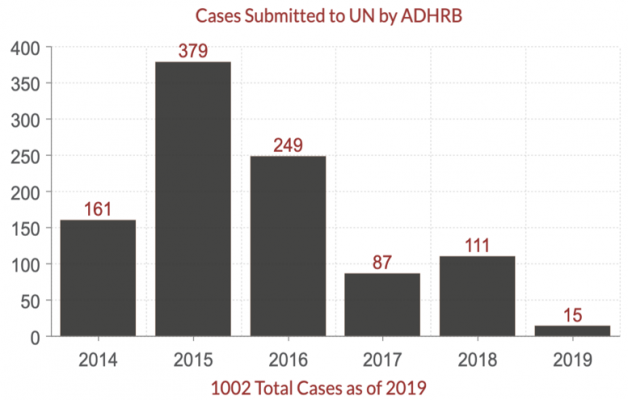 In October 2013, Americans for Democracy & Human Rights in Bahrain (ADHRB) began its United Nations (UN) Complaint Program to assist individuals suffering from human rights abuses in Bahrain and the broader Gulf region. ADHRB complains on behalf of victims to the Special Procedures offices of the UN, who then communicate with the offending government for an explanation regarding the allegations. As of April 2019, over 1,000 complaints have been submitted by ADHRB to the UN Special Procedures on behalf of Bahraini individuals subjected to rights violations.
In October 2013, Americans for Democracy & Human Rights in Bahrain (ADHRB) began its United Nations (UN) Complaint Program to assist individuals suffering from human rights abuses in Bahrain and the broader Gulf region. ADHRB complains on behalf of victims to the Special Procedures offices of the UN, who then communicate with the offending government for an explanation regarding the allegations. As of April 2019, over 1,000 complaints have been submitted by ADHRB to the UN Special Procedures on behalf of Bahraini individuals subjected to rights violations.
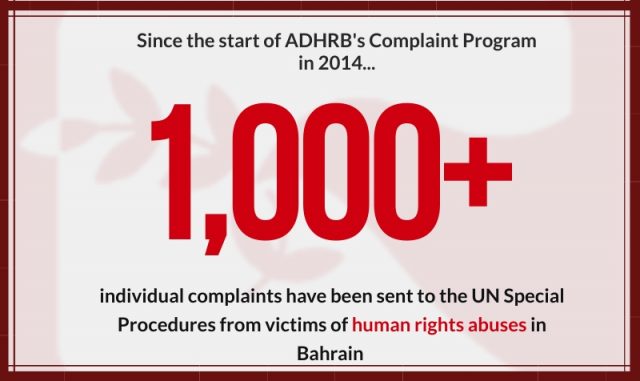
High Profile Cases
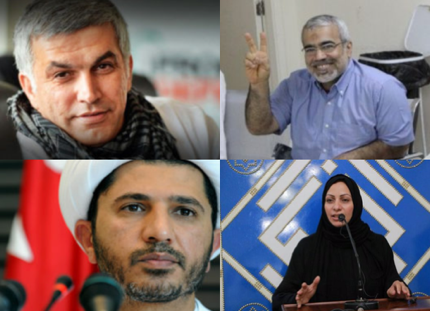 ADHRB has submitted complaints of behalf of thousands of Bahrainis, including high-profile individuals such as prominent human rights defender Nabeel Rajab, prisoner of conscience Dr. Abduljalil al-Singace, political leader Sheikh Ali Salman, and women human rights defender Ebtisam Al-Saegh. All of their cases highlight Bahrain’s ill-treatment and arbitrary sentencing of activists and politicians in reprisal for their work. In addition, ADHRB has advocated and complained on behalf of many lesser-known Bahraini victims that have been tortured, denied due process, and subjected to inhumane prison conditions. Through ADHRB’s complaint program, 1002 Bahrainis have been represented and brought to the attention of the UN Special Procedures offices.
ADHRB has submitted complaints of behalf of thousands of Bahrainis, including high-profile individuals such as prominent human rights defender Nabeel Rajab, prisoner of conscience Dr. Abduljalil al-Singace, political leader Sheikh Ali Salman, and women human rights defender Ebtisam Al-Saegh. All of their cases highlight Bahrain’s ill-treatment and arbitrary sentencing of activists and politicians in reprisal for their work. In addition, ADHRB has advocated and complained on behalf of many lesser-known Bahraini victims that have been tortured, denied due process, and subjected to inhumane prison conditions. Through ADHRB’s complaint program, 1002 Bahrainis have been represented and brought to the attention of the UN Special Procedures offices.
Cases Submitted to Special Procedures Offices
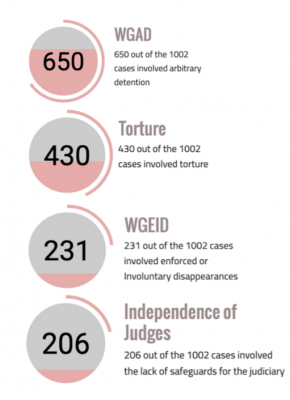 The Special Procedures offices of the United Nations are made up of Independent Experts, Special Rapporteurs, and Working Group – dealing with both thematic areas of human rights and specific countries. These offices receive complaints from either the individuals themselves who are victims of human rights abuses or from organizations, like ADHRB, representing these individuals. The individuals that ADHRB has represented have had their cases highlighted by numerous Special Procedure offices, creating international pressure and a better chance of justice for victims. Of the 1002 cases submitted by ADHRB, 650 cases were sent to the Working Group on Arbitrary Detention (WGAD), 430 cases were sent to the Special Rapporteur on torture and other cruel, inhuman or degrading treatment or punishment, 231 cases were sent to the Working Group on Enforced or Involuntary Disappearances (WGEID), and 206 cases were sent to the Special Rapporteur on the independence of judges and lawyers.
The Special Procedures offices of the United Nations are made up of Independent Experts, Special Rapporteurs, and Working Group – dealing with both thematic areas of human rights and specific countries. These offices receive complaints from either the individuals themselves who are victims of human rights abuses or from organizations, like ADHRB, representing these individuals. The individuals that ADHRB has represented have had their cases highlighted by numerous Special Procedure offices, creating international pressure and a better chance of justice for victims. Of the 1002 cases submitted by ADHRB, 650 cases were sent to the Working Group on Arbitrary Detention (WGAD), 430 cases were sent to the Special Rapporteur on torture and other cruel, inhuman or degrading treatment or punishment, 231 cases were sent to the Working Group on Enforced or Involuntary Disappearances (WGEID), and 206 cases were sent to the Special Rapporteur on the independence of judges and lawyers.
Joint Communications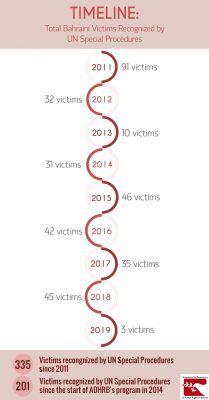
Once a complaint is received, Special Procedures submit information to the offending government, seeking an explanation regarding the allegations. Governments are asked to respond, but some choose not to. At the end of the process, the Procedures publish the allegations on the UN website and these are included in a Joint Communications Report ahead of the next Human Rights Council session. In addition, the Working Group on Arbitrary Detention (WGAD) may issue official Opinions regarding the status of detained individuals when applicable, and the Working Group on Enforced and Involuntary Disappearances (WGEID) can request the government to clarify and make known the whereabouts of a disappeared person.
Since 2011 the United Nations Special Procedures has sent 90 joint communications to Bahrain as of April 2019. These communications have recognized more than 330 individual victims. Cases have been highlighted by the following mandates:
- The Working Group on Arbitrary Detention (43)
- The Special Rapporteur in the field of cultural rights (2)
- The Special Rapporteur on the rights of persons with disabilities (1)
- The Working Group on Enforced and Involuntary Disappearances (6)
- The Special Rapporteur on the right to education (2)
- The Special Rapporteur on extrajudicial, summary or arbitrary executions (16)
- The Special Rapporteur on the promotion and protection of the right to freedom of opinion and expression (54)
- The Special Rapporteur on the rights to freedom of peaceful assembly and of association (41)
- The Special Rapporteur on the right of everyone to the enjoyment of the highest attainable standard of physical and mental health (15)
- The Special Rapporteur on the situation of human rights defenders (52)
- The Special Rapporteur on the independence of judges and lawyers (24)
- The Special Rapporteur on the human rights of migrants (3)
- The Special Rapporteur on extreme poverty and human rights (1)
- The Special Rapporteur on the right to privacy (1)
- The Special Rapporteur on freedom of religion or belief (14)
- The Special Rapporteur on the promotion and protection of human rights and fundamental freedoms while countering terrorism (9)
- The Special Rapporteur on torture and other cruel, inhuman or degrading treatment or punishment (49)
- The Special Rapporteur on violence against women, its causes and consequences (5)
- The Special Rapporteur on the human rights to safe drinking water and sanitation (1)
- The Working Group on the issue of discrimination against women in law and in practice (5)
Find PDF of briefing document here.





